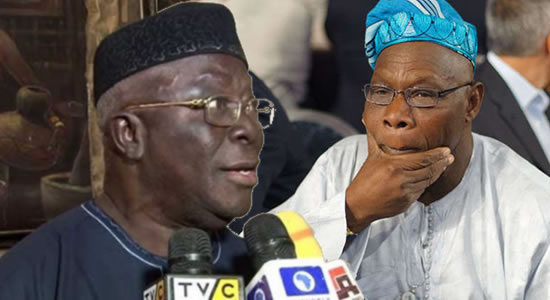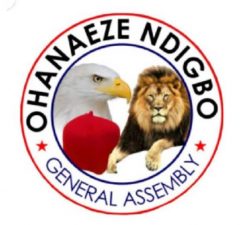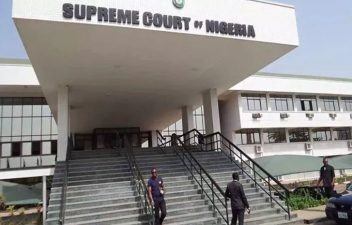By Kemi Kasumu, General Editor
The nanogerian-in-the-waiting attacked the former President in the 233-page book, reviewed by Professor Wale Adebanwi, particularly in Chapter 13. “As for Obasanjo, the author reserves his severest content. Obasanjo’s tenure as President, he declared was a calamity, adding that for all the negative things that people have said about Obasanjo which he could not refute, if it were to be in a decent society, people like him will not feature in public life again. There’s more, when you read the book,” Adebanwi, the book reviewer said.
Tuesday April 8, 2018 had come and had gone. Two things will refused to go with it: that it was a day a 233-page book titled, “Telling It As It is”, an autobiography of Chief Ayo Adebanjo, was publicly presented in Lagos and that in the book, a resemblance of what the day of reckon will be for former President Olusegun Obasanjo was flashed with regard to how he, according to the author, not only did not go equity with clean hands in his eight years as civilian President of Nigeria but also how he should not assume the moral right to accuse anyone of being corrupt therefore.
Chief Ayo Adebanjo, the author, who penned down the book to mark his 90th birthday anniversary, is a prominent Afenifere Chieftain, who even in previous media interviews with this reporter had never hidden his discontent about Chief Olusegun Obasanjo’s misdoings during and post-government. In those interviews, the vibrant Awoist, who only because of Goodluck Jonathan re-election as President punctured the Yoruba people for him, repeated exposed Obasanjo as the brain behind the woes of Yoruba Race and promised to one day put a book together which would details his concerns in that regard.
“Telling It As It Is” is the fulfillment of the promise of the past and April 3 that was the day of public presentation of the 233-page book provided the long awaited opportunity for the Ijebu chief to tell it to the face of the man called “Ebora Owu” in some Yoruba quarters that he not only caused the travails that have moved caused setback for the Yoruba Race till present but also that he was the very destroyer of Alliance for Democracy, which was political ideology with which the race had planned to move forward as a region of Nigeria and to contribute to national rearmament as a partakers in national econo-political restructuring.
In the book, Chief Ayo Adebanjo describes former President Olusegun Obasanjo’s administration of Nigeria (1999-2007) as full of tragedy and calamity.
Wrapping Obasanjo up as having no moral right to accuse anyone of being corrupt and describing him as a “whited sepulcher,” according to the autobiography, Adebanjo said the former President had not disputed that he had only N20,000 in his bank account as of when he returned from the prison in 1999 and that a former Vice-President, Atiku Abubakar, and a businessman, Oyewole Fasawe, saved him from bankruptcy.
He said if Nigeria were a decent society, people like Obasanjo would never feature in public life again, saying it continued to amaze him how people continued to give the former President “undue prominence in spite of his known character.”
He however looked forward to a time government “would take Obasanjo’s Presidential Library Complex in Abeokuta” from the former President.
Adebanjo, who will turn 90 years on April 10, said these in his autobiography, “Telling It As It Is”, which was publicly presented in Lagos on Tuesday.
The nanogerian-in-the-waiting attacked the former President in the 233-page book, reviewed by Professor Wale Adebanwi, particularly in Chapter 13.
“As for Obasanjo, the author reserves his severest content. Obasanjo’s tenure as President, he declared was a calamity, adding that for all the negative things that people have said about Obasanjo which he could not refute, if it were to be in a decent society, people like him will not feature in public life again. There’s more, when you read the book,” Adebanwi, the book reviewer said.
Adebanwi said further that the book is sharpest criticism for a fellow Yoruba leader. The author in the book described Obasanjo’s eight years in government between 1999 and 2007 as a civilian President as a tragedy and calamity, declaring that his scorecard was nothing to write home about.
“The man who carried on as if he was all-in-all failed woefully on all counts as President. His eight-year tenure (1999-2007) was a tragedy. His scorecard was nothing to write home about. What did he do in eight years? Before he came, we were buying fuel for N20 per litre, and crude oil was $23 per barrel. In 2007, under his regime, we were buying fuel at N75 per litre, and crude oil was between $65 and $75 per barrel. In the worst days of Abacha, one dollar was over N20,” Adebanjo wrote in the book.
In the book, Adebanjo did not only fault Obasanjo’s eight-year democratic rule. He raises the question of Chief Bola Ige’s decision to join the Obasanjo’s administration which he ranked as one of the gravest and one of the most fatal political errors ever committed by a leading progressive politician in Nigeria’s history.
The author, however, describes Chief Ige as brilliant, one of the greatest Awoist.
“We were opposed to Ige joining Obasanjo’s cabinet but he accepted the appointment oblivious of the fact that Obasanjo was not inviting him in good faith. Bola Ige didn’t need Obasanjo, it was Obasanjo who needed Ige.
“However, how a man of such superb and enviable endowment could join the cabinet of one of the most perverse figures in our political history is a question that the author attempts to grabble with in this book,” Adebanwi added while reviewing the book.
At the event, chaired by a former military Vice-President, Navy Commodore Ebitu Ukiwe (Rtd), were the All Progressives Congress (APC) leader, Bola Tinubu, and former governors of Ogun State, Chief Olusegun Osoba and Otunba Gbenga Daniel.
Also present were former Commonwealth Secretary General, Chief Emeka Anyaoku, former Secretary to the Government of the Federation, Chief Olu Falae, former Minister of State for Defence, Senator Musiliu Obanikoro, a former Minister of Industry, Mrs Nike Akande, the founder of Latter Rain Assembly, Pastor Tunde Bakare, and Chief Albert Horsfall.




